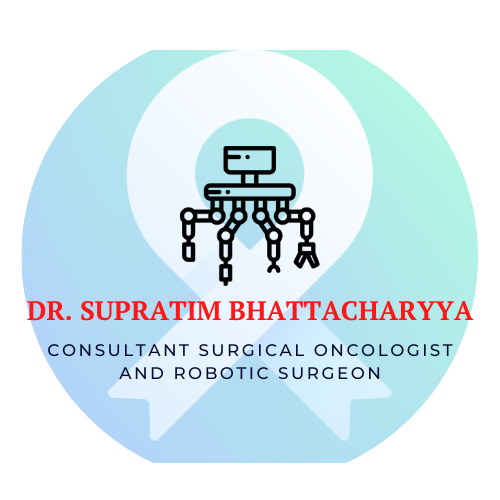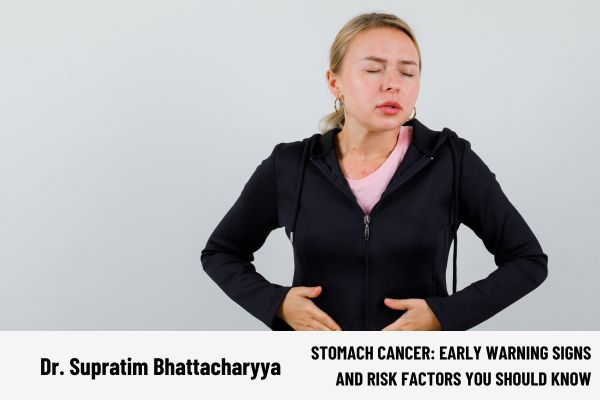Stomach Cancer: Early Warning Signs and Risk Factors You Should Know with Dr. Supratim Bhattacharyya
Stomach cancer, also known as gastric cancer, is a serious condition that can affect the lining of the stomach. Early detection is key to improving treatment outcomes, and understanding the symptoms and risk factors is the first step toward better health. In this blog, Dr. Supratim Bhattacharyya, an expert in oncology, sheds light on the early warning signs, symptoms, and risk factors of stomach cancer, providing valuable insights on how to recognize it early and take preventive measures.
Early Warning Signs of Stomach Cancer
- Persistent Indigestion or Heartburn
Experiencing chronic indigestion that doesn’t resolve with over-the-counter remedies can be a red flag for gastric cancer. - Abdominal Pain or Fullness
Feeling a persistent sensation of fullness, even after consuming small amounts of food, or experiencing unexplained abdominal pain may be a sign of stomach cancer. - Unexplained Weight Loss
Significant, unintended weight loss without changes to your eating habits or physical activity can indicate a more serious health concern. - Nausea and Vomiting
Frequent nausea and vomiting, especially with traces of blood, should never be ignored. - Fatigue and Weakness
A feeling of constant tiredness, fatigue, or weakness could be due to anemia, which may result from internal bleeding linked to stomach cancer.
Key Risk Factors for Stomach Cancer
- Helicobacter Pylori (H. pylori) Infection
Infection with the bacteria H. pylori is one of the leading causes of stomach cancer. If left untreated, it can cause chronic inflammation and increase the risk of developing gastric cancer. - Unhealthy Diet
Diets rich in salty, smoked, or pickled foods can elevate your chances of developing gastric cancer. Including more fresh fruits and vegetables in your diet can help reduce your risk. - Tobacco and Alcohol Use
Smoking and heavy alcohol consumption are known to increase the risk of many cancers, including stomach cancer. - Family History
A family history of stomach cancer may increase your risk. Genetic predispositions can play a significant role in the development of gastric cancer. - Age and Gender
Stomach cancer is more common in individuals over the age of 50, with men being at a higher risk compared to women. - Obesity
Being overweight or obese can increase the likelihood of developing many types of cancer, including gastric cancer.
How to Reduce Your Risk of Stomach Cancer
- Adopt a Healthy Lifestyle: Incorporate fresh fruits, vegetables, and whole grains into your diet. Avoid excessive consumption of salted and processed foods.
- Quit Smoking: Smoking cessation is crucial to lowering your risk of stomach cancer and many other cancers.
- Limit Alcohol Intake: If you drink alcohol, do so in moderation.
- Screening and Regular Check-Ups: If you have risk factors or experience persistent symptoms, consult with your healthcare provider for early screening.
- Treat H. pylori Infection: Early detection and treatment of H. pylori infections can help reduce the risk of stomach cancer.
When to Seek Medical Advice
If you experience any of the above symptoms for more than a few weeks, it is crucial to see a healthcare provider. Early diagnosis significantly increases the chances of successful treatment and recovery.
Highlighted Keywords:
- Stomach cancer
- Gastric cancer
- Early warning signs
- Risk factors for stomach cancer
- Helicobacter pylori infection
- Symptoms of gastric cancer
- Weight loss and stomach cancer
- Abdominal pain and fullness
Dr. Supratim Bhattacharyya emphasizes the importance of early detection in the successful treatment of stomach cancer. By staying aware of the symptoms and understanding the risk factors, you can take proactive steps toward safeguarding your health. If you experience any concerning symptoms, don’t hesitate to consult with a healthcare professional for further evaluation and advice.

